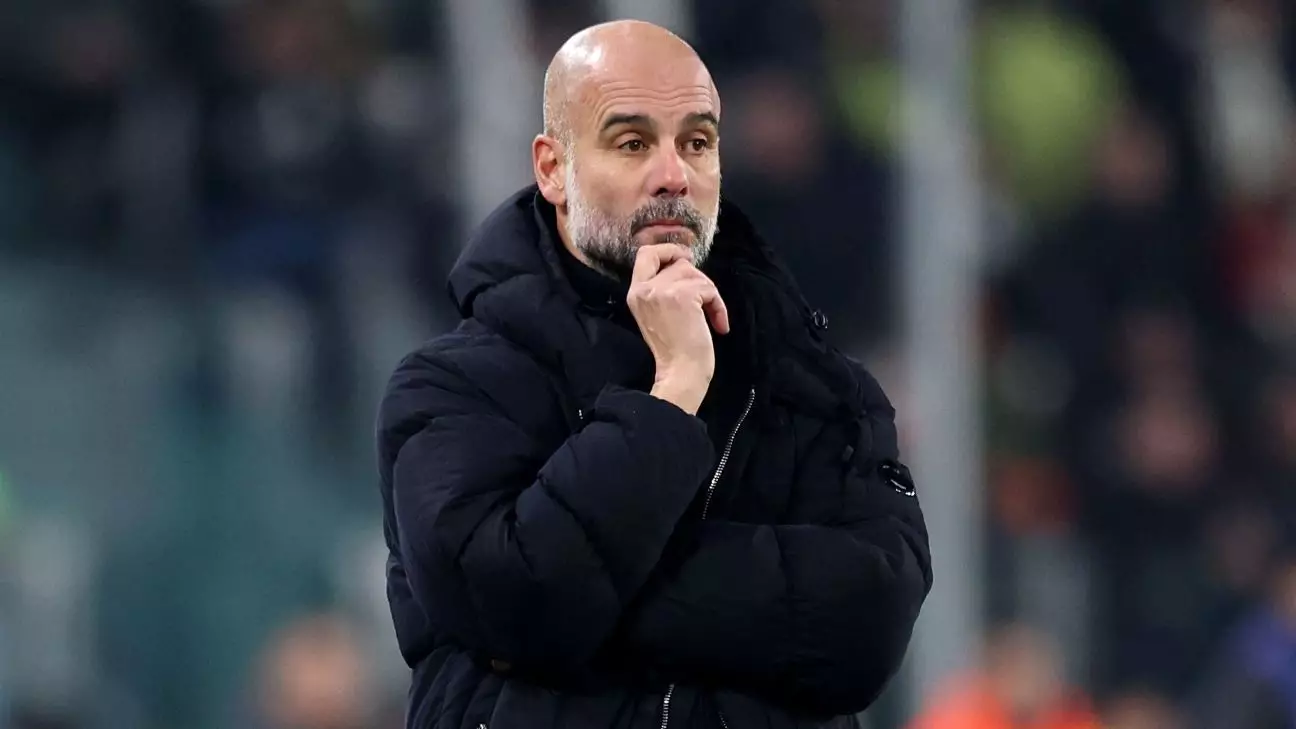Just months ago, Manchester City stood tall as a formidable force in world football, basking in the glory of their 2023 Champions League triumph. Fast forward to their recent 2-0 loss against Juventus in Turin, and the atmosphere surrounding the club has transformed dramatically. Once seen as an indomitable giant under the strategic genius of Pep Guardiola, City now wallows in uncertainty, battling to stave off the threat of elimination from the Champions League. The recent string of poor performances has not only raised questions about the team’s capabilities but also about the future of Guardiola himself, who seems to be wrestling with issues he previously evaded throughout his illustrious career.
This season has witnessed City’s decline from elite challengers to potential dropouts, currently languishing in 22nd position, just above Paris Saint-Germain in the Champions League standings. The implications of another defeat against PSG loom ominously, as the specter of early elimination becomes all too real. The weight of expectation, which once gilded Guardiola’s tenure, now feels like a boulder on his shoulders—a far cry from the unshakeable confidence exuded by the tactician in his previous managerial spells.
The juxtaposition of Guardiola’s past triumphs against the current turmoil is striking. Having led City to 18 trophies in six years, his managerial acumen has always positioned him as a step above the rest. However, with an unprecedented seven losses in just ten games, the question arises: At what point does a manager’s record become a liability? Guardiola’s recent behavior on the sidelines—marked by a visibly restrained demeanor and a lack of instructional presence—suggests a man grappling with self-doubt. Historically, Guardiola has been a manager unafraid to enact drastic changes, yet the recent matches show a reluctance to adapt, raising concerns over his effectiveness in reversing the current trend.
Juventus, struggling with their own inconsistencies, displayed a resolute defensive performance that thwarted City’s attack. Guardiola’s decision to delay substitutions until the dying moments of the match only highlights a growing hesitance to react assertively to in-game developments, leaving his team’s tactics static against a side they should have overpowered on paper. This habitual inactivity during matches contrasts sharply with his historical approach of being proactive in the face of adversity.
During his previous managerial stints, Guardiola faced setbacks, but they differ from the current plight of City. His gradual trajectory of success has insulated him from the broader crises other managers have experienced. However, the tides have turned, and now Guardiola finds himself in uncharted waters, undertaking the diverse demands of reviving a faltering team. His admission of self-questioning post-match reveals a glimpse of vulnerability seldom seen in a manager of his caliber—an unsettling shift that might signify a crack in the armor of a previously unassailable figure in football.
A notable area of concern is his handling of veteran players like Kevin De Bruyne and Ilkay Gündogan, whose waning energy levels were obvious in Turin. The reluctance to substitute players who have contributed significantly in the past reflects a lack of tactical foresight. This oversight is troubling, especially when considering the modern football landscape, which often favors younger, more energetic squads. Guardiola’s struggles to inject fresh vigor into a team seemingly running out of steam are becoming increasingly apparent.
As City’s disarray deepens, questions about Guardiola’s long-term future at the club intensify. A recent two-year contract extension initially symbolized stability, but it now feels more like a ticking clock. The potential of going from Champions League victors to early eliminations within such a short span raises the stakes for all involved, placing immense pressure on the manager’s shoulders. His suggestion that this season could be his last hints at a man contemplating his next steps amidst a crisis he never thought he would face.
As City prepares for upcoming fixtures, including a crucial match against PSG, the urgency for results is palpable. Their position in the Premier League is equally precarious, trailing behind top competitors by eight points, with the arduous journey ahead compounded by commitments like the FIFA Club World Cup. Guardiola and his squad appear to be at a crossroads, where a turnaround in fortune seems increasingly elusive. The notion that Guardiola’s illustrious tenure could face an abrupt end feels both surreal and increasingly plausible, leaving fans and analysts alike to question whether the vibrant ethos of Manchester City’s footballing philosophy is slipping away, possibly leaving behind a legacy tarnished by recent failures.

